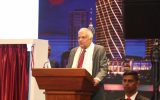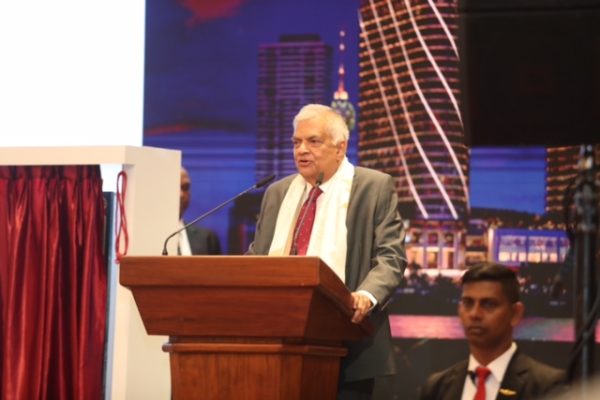- Advocates for Education and Health Sector Modernization and advancement.
- Pledges increased funding to bolster these sectors starting this year.
COLOMBO President Ranil Wickremesinghe emphasized that the future of the country hinges on modernizing the education and health sectors to align with forthcoming challenges and opportunities.
President Ranil Wickremesinghe stressed the imperative of modernizing the education and health sectors to ensure the country’s future prosperity and development.
The President highlighted a significant shortfall in capital expenditure for education and health over the past three and a half decades. It is now planned to increase capital expenditure in these sectors starting from this year.
President Ranil Wickremesinghe made this remark while attending the inauguration of the “German-Sri Lanka Friendship New Women’s Hospital” in Karapitiya Galle, hailed as the largest maternity hospital in South Asia, earlier today (27).
The six-story hospital claims 640 beds, 6 operating theatres, emergency treatment units, intensive care units, laboratories, infant intensive care units, special paediatric units, and state-of-the-art medical facilities. Additionally, it features water purification and recycling unit.
The German government has contributed Euro 25 million (LKR 3570 million) in this project, in addition to providing medical equipment.
Initially, eight hundred perches were allocated for the hospital’s construction, but later, two additional plots of land were acquired, increasing the total area of the hospital to nearly one thousand perches.
Former Chancellor of Germany, Helmut Kohl, made this significant donation towards the construction of a new maternity hospital in Sri Lanka. This gesture came after witnessing the devastation caused by the tsunami to Mahmodara Hospital Galle, the largest maternity hospital in the southern province, during his vacation in December 2004 at a tourist hotel in Talpe, Habaraduwa.
Following the inauguration of the new hospital, plans are underway to relocate the Mahmodara Maternity Hospital from its current location.
President Ranil Wickremesinghe also visited the newly opened maternity hospital to inspect its facilities, including the state-of-the-art surgery rooms.
President Wickremesinghe expressed gratitude by presenting a memento to the German Ambassador to Sri Lanka, Dr. Felix Neumann, in appreciation of the generous donation received from the German government.
During his address at the ceremony, President Ranil Wickremesinghe highlighted the shift in healthcare challenges over time.
“Previously, our medical professionals battled against diseases like malaria. However, with the rise in the elderly population and the emergence of various health issues, the complexities in the healthcare sector have escalated. Hence, it is imperative to adapt and transform our healthcare services to meet these evolving challenges effectively.
Furthermore, the education system in our nation necessitates a significant overhaul. Historically, the allocation of capital funds for education and healthcare has been limited. During that period, these sectors did not receive sufficient financial support, primarily due to the substantial allocation of funds towards wartime efforts. Additionally, a considerable portion of our budget has been directed towards servicing hefty loans and paying off interest.
During my tenure as the Minister of Education from 1980 to 1989, efforts were made to increase funding for education. However, various circumstances hindered our ability to allocate more resources to this sector subsequently. Moving forward, it is imperative that we prioritize increased investment in education for the betterment of our nation.
Due to extensive borrowing last season, a staggering 50% of our income is now allocated towards debt and interest payments. Although over 7 trillion was earmarked for this year’s budget, a significant portion, totalling 3.9 trillion, must be directed towards debt repayment. Of this amount, one-third is dedicated to loan settlement, while the remaining two-thirds are allocated for interest payments. Additionally, approximately 1.2 trillion is allocated for salaries. After accounting for recurring expenses, there is very little remaining for essential activities such as irrigation.














